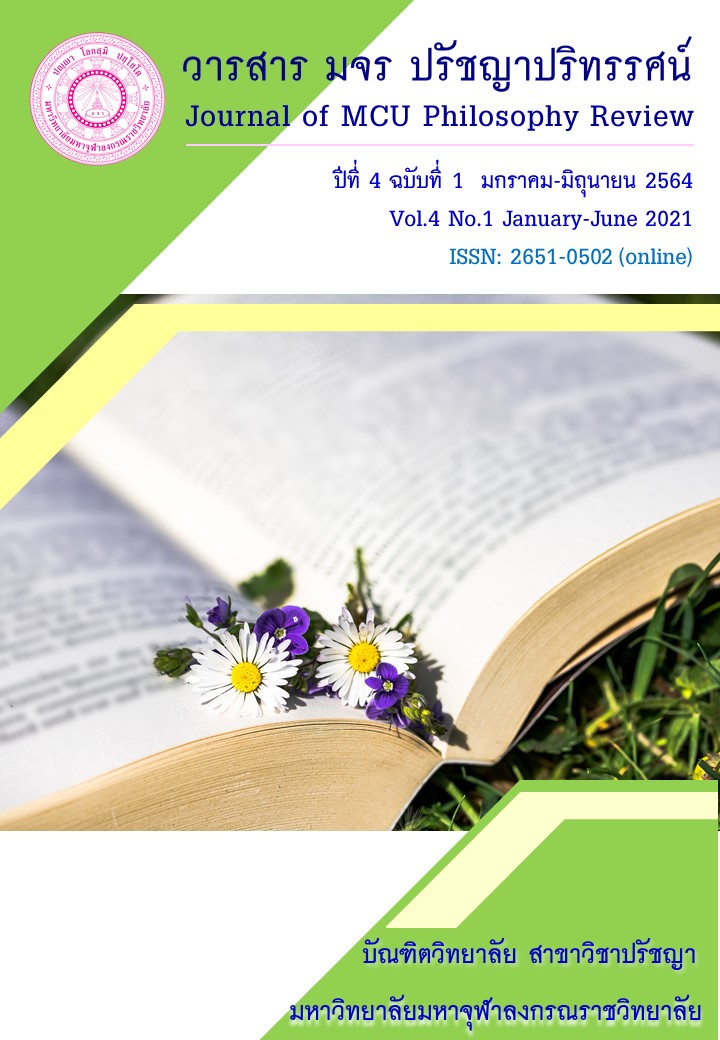Training Process for Leadership Development: According to Buddhist Ecclesiastical Official Monk Development Project in Songha Administration in Region 10
Main Article Content
Abstract
The study aims 1) to study the training process of a Program of Sangha Leasers Development in Sangha Administrative Area X; and 2) to study problems, hindrances and suggestions for a Program of Sangha Leasers Development in Sangha Administrative Area X. The study is a mixed methods research between a qualitative method and quantitative one in nature. For collecting qualitative data an In-depth interview is used to collect data from key informants. A questionnaire is used to collect quantitative data from 76 respondents. A content analysis is employed for analyzing qualitative data and statistics including Percentage, Mean and Standard Deviation is used for analyzing quantitative data. The result found that:
1. The achievement of the training process for the development in general in each aspect was high from the highest to least, namely, outcomes, behaviors, learning process and reaction respectively and a Program of Leadership focused on the training process emphasizing arts, psychology and participatory process based on the theory of Ken Robinson and Lou Aronica, the principles of virtues of a ruler, good governance and participation.
2. The result found that they had knowledge and ability to manage a Program well, the Program strengthened good Sangha leaders and built up them as good leaders of the community and for the dissemination of Buddhism as well, moreover, the Program was suitable for a modernized Buddhist dissemination, it could have been effectively applied for their work in the scope of Sangha high authorities’ policy, and all participants felt very proud of the participation in.
Article Details
บทความที่ได้รับการตีพิมพ์เป็นลิขสิทธิ์ของวารสาร มจร ปรัชญาปริทรรศน์
ข้อความในบทความที่ได้รับการตีพิมพ์ในวารสาร ถือเป็นความรับผิดชอบของผู้เขียนบทความ และข้อคิดเห็นนั้นไม่ถือว่าเป็นทัศนะและความรับผิดชอบของกองบรรณาธิการวารสาร มจร ปรัชญาปริทรรศน์
References
พระมหารุ่งโรจน์ ธมฺมฎฺฐเมธี. (2551). การศึกษาวิเคราะห์หลักภาวะผู้นำในพระพุทธศาสนาเถรวาท, วิทยานิพนธ์พุทธศาสตรมหาบัณฑิต, บัณฑิตวิทยาลัย: มหาวิทยาลัยมหาจุฬาลงกรณราชวิทยาลัย.
พระมหาสุระพงษ์ สุรวํโส. (2555). ภาวะผู้นำของพระสงฆ์ในการบริหารการพัฒนาชุมชน: กรณีศึกษาพระครูโพธิวีรคุณ วัดโพธิการาม ตำบลโพนสูง อำเภอปทุมรัตน์ จังหวัดร้อยเอ็ด. วิทยานิพนธ์ศิลปะศาสตร์มหาบัณฑิต สาขาการบริหารการพัฒนาสังคม คณะพัฒนาสังคมและสิ่งแวดล้อม:สถาบันบัณฑิตพัฒนบริหารศาสตร์.
สมศักดิ์ บุญปู่. (2552). พระสงฆ์กับการศึกษาไทย, กรุงเทพมหานคร : มหาวิทยาลัยมหาจุฬาลงกรณราชวิทยาลัย.
สำนักงานคณะกรรมการพัฒนาการเศรษฐกิจและสังคมแห่งชาติ สำนักนายกรัฐมนตรี. (2560). แผนพัฒนาเศรษฐกิจและสังคมแห่งชาติ ฉบับที่สิบสอง พ.ศ.2560-2564, http://www.nesdb.go.th/download/plan12/แผนพัฒนาเศรษฐกิจและสังคมแห่งชาติฉบับที่12.pdf. (15 มกราคม 2560)
อารีย์ วชิรวราการ. (2542). การวัดและการประเมินผลการเรียน. พิมพ์ครั้งที่ 1. สถาบันราชภัฏธนบุรี.
Ken Robinson and Lou Aronica. (2560). โรงเรียนบันดาลใจ (Creative Schools). แปลโดย วิชยา ปิตชามุก. พิมพ์ครั้งที่ 2. กรุงเทพมหานคร: openworlds.


